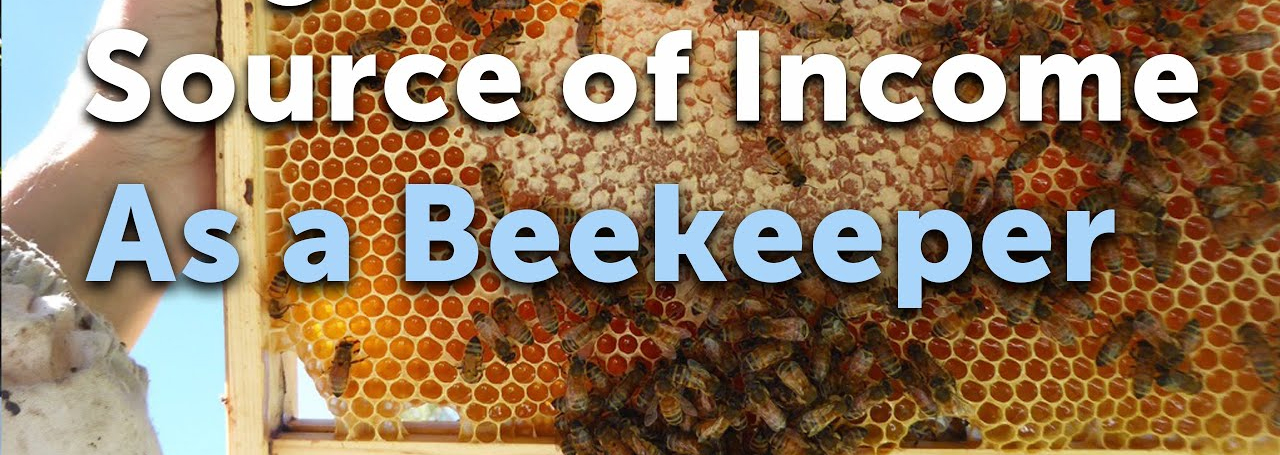
Beekeeping - Multiple Source Of Income
Benefits of Beekeeping
Beekeeping has both direct and indirect benefits. The direct benefits are the hive products: honey, beeswax, pollen, royal jelly, bee venom, propolis, and bee colonies. These can be consumed to improvea family's nutrition, sold for cash income, or used as a basis for enterprise development, for example cosmetics based on beeswax. The indirect benefits include pollination, which leads both to increased crop productivity and maintenance of natural biodiversity, including sustaining the natural products used by farmers. Beekeeping also generates off-farm employment opportunities in different fields including hive carpentry, production and sale of honeybee colonies, honey trading, renting of bees for pollination, and bee-based micro enterprises. Beekeeping is ideally suited as a means of income generation for a wide range of people with otherwise limited opportunities, including the poorest of the poor, women, and people from disadvantaged groups. It usually needs only a very small start up investment, can be carried out in a small space close to the house, and yields profits within the first year of operation.
- In India farmers have small land holdings. Beekeeping does not used any land, therefore, small holders and even landless people can undertake beekeeping.
- Beekeeping work does not compare with any branch of agriculture.
- Beekeeping does not require continuous labour and thus is good for disguised labour.
- Managing bee colonies does not require heavy physical work, therefore even women and children can maintain bees.
- Heavy investment is not required for beekeeping
- Beekeeping requires some equipments. This encourages artisans to undertake these jobs
- Honey is the diet of farmer's family makes the diet more balanced.
- Beekeeping can occupy an important place in the economy of farmers. Income from honey supplements the main income from crops and subsistence farmer can get a higher income from beekeeping than from all other work.
- Bees wax is the second crop from beekeeping. The wax has commercial and industrial value, especially cosmetic industry
- Sale of colonies by division is another source of income. Good beekeepers can even sell superior queens raised from better-performing colonies.
- Production of other hive products like royal jelly, bee venom, propolis and pollen can further be the sources of income.
- During nectar and pollen gathering, the honeybees effect pollination and improve the quantity and quality of crop produce. The benefits through pollination and derived by a community rather than only by the beekeeper. Beekeeper himself can increase his income by renting out his bee colonies for pollination services. This practice is well established in many countries and is picking up even in India. Apiculture fits very well with the concept of Integrated Farming System because of the following reasons.
- IFS system is indeed an ecofriendly low input organic farming which is highly favourable for bee keeping.
- Bee keeping helps in realizing higher crop productivity. It adds upto farm profitability mainly through increased cross pollination. It has been estimated that the value of increase in crop yields through pollination is 15-20 times more than the value of honey produced by honey bees.
- Cross pollinated crops grown in IFS provide either pollen or nectar or both for the bees.
- Crop diversity maintained and crop rotation followed in IFS give ample good for bees.
- Mutualistic relationship existing between bees and bee crops makes apiculture an ideal component in IFS.
- Crop pollination requires a large population of bees during the brief blooming period of each crop and honey bees are one of the few potential pollinators that can be cultured in large number. Colonies can be fed and managed so that peak populations are obtained to coincide with bloom.
- Bee keeping does not take up any extra land and it does not compete with other enterprises for land.
- Indeed, loss of native bees as a result of habitat destruction, insecticide impact and lack of diversity in monocultural systems necessitate the inclusion of apiculture as a vital component in IFS.
- Hive products like honey, pollen and propolis obtained through bee keeping fetch additional income for farmers.
- Apiculture also generates new employment opportunities or leads to effective utilization of family labour.
- The farmer can also hire the bee colonies to needy farmers for pollination service. Thus the farmer can also earn money through pollination rental as practiced in western countries.
Beekeeping is a multiple source of income
Major Challenges
Many factors can pose a challenge to beekeepers and hinder the promotion of beekeeping in the Hindu Kush Himalayan region. They can be broadly grouped under threats to bee survival, barriers to honey trade, lack of knowledge, and non-conducive policies. The main factors are summarized below.
- Lack of a pesticide residue monitoring programme;
- Lack of accredited laboratories and equipment
- Lack of a certification
- Poor quality honey due to lack of processing and packaging services at different levels
Threats to survival
- Lack of awareness at the farmer's level about the role of honeybees in pollination and biodiversity conservation
- Lack of knowledge sharing among key stakeholders both within countries and especially at the regional level
- Lack of skilled labour and effective mobilization of existing labour
- Lack of technology development and research on beekeeping
- Lack of technology development and research on beekeeping
- Non-conducive policy environment
- Inadequate policies on beekeeping